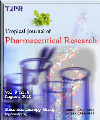
|
Tropical Journal of Pharmaceutical Research
Pharmacotherapy Group, Faculty of Pharmacy, University of Benin, Benin City, Nigeria
ISSN: 1596-5996
EISSN: 1596-5996
Vol. 13, No. 2, 2014, pp. 217-224
|
 Bioline Code: pr14031
Bioline Code: pr14031
Full paper language: English
Document type: Research Article
Document available free of charge
|
|
|
Tropical Journal of Pharmaceutical Research, Vol. 13, No. 2, 2014, pp. 217-224
| en |
Cytotoxicity of Gemcitabine-Loaded-Microemulsions in Breast and Colon Cancer Cells
Alkhatib, Mayson H. & Alkhayyal, Norah S.
Abstract
Purpose: To evaluate the antitumor activity of gemcitabine (GEM), incorporated in microemulsions with
varying surfactant-to-oil (S/O) ratio, against MCF-7 breast cancer cells and HCT 116 colon cancer cells.
Methods: The microemulsion formulations consisted of Tween 80, Span 20, isopropyl myristate (IPM)
and aqueous ethanol (40 %). Anticancer assessment involved determination of hemolysis activity,
screening for cytotoxicity using sulphorhodamine B assay and determination of the mechanism of cell
death using light microscope and ApopNexin FITC apoptosis detection kit.
Results: Hemolysis activity of all the microemulsion formulations, either blank or drug-loaded, was
significantly less than that of GEM solution. On average, MCF-7 cell viability significantly (p < 0.05)
decreased from 38.53 ± 6.04 to 30.1 ± 4.66 % when the administered microemulsion concentration in
modified eagle medium (MEM), increased from 0.03 to 0.3 % v/v but significantly (p < 0.05) increased
by 1.4-fold when exposed to GEM solution at equivalent concentrations. In contrast, the cytotoxicity of
the microemulsion formulation against HCT116 cells was similar to that of 0.03 % v/v GEM solution but
greater than that of GEM solution by 1.5-fold when their concentration in MEM increased to 0.3 %v/v.
Microscopic studies show that the microemulsions stimulated apoptosis in MCF-7 and HCT116 cell
within 48 h and at low concentration (0.03 %v/v).
Conclusion: Microemulsion formulations improved the efficacy of GEM and induced apoptosis in MCF-
7 and HCT116 cells.
Keywords
Apoptosis; MCF-7 breast cancer cells; HCT116 colon cancer cells; Hemolysis; Sulphorhodamine B assay; Microemulsion
|
| |
© Copyright 2014 - Tropical Journal of Pharmaceutical Research
Alternative site location: http://www.tjpr.org
|
|
